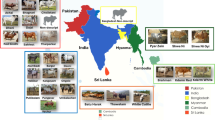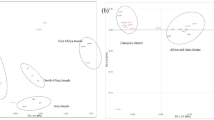Abstract
THE problem of the acclimatization of breeds of livestock exported from one country to another is interesting. Certain breeds quickly adapt themselves to pertain environmental conditions far removed from those under which they were reared. But, generally speaking, the importation of domesticated breeds into countries of different climatic and soil conditions is regarded as a somewhat risky enterprise. The genetic constitution of the modern breeds has so changed during the last hundred years that many of them depend entirely upon human assistance, and have lost, to a great degree, the ability to live under natural conditions. If this happens in a country, it may be advisable to import foreign breeds of strong constitution which are better adapted than the local breeds, weakened through the continued use of false standards of selection over many generations.
This is a preview of subscription content, access via your institution
Access options
Subscribe to this journal
Receive 51 print issues and online access
$199.00 per year
only $3.90 per issue
Buy this article
- Purchase on SpringerLink
- Instant access to the full article PDF.
USD 39.95
Prices may be subject to local taxes which are calculated during checkout
Similar content being viewed by others
Author information
Authors and Affiliations
Rights and permissions
About this article
Cite this article
PRAWOCHENSKI, R. Acclimatization in Relation to Livestock Improvement. Nature 141, 922 (1938). https://doi.org/10.1038/141922a0
Issue date:
DOI: https://doi.org/10.1038/141922a0



